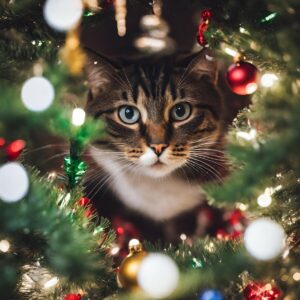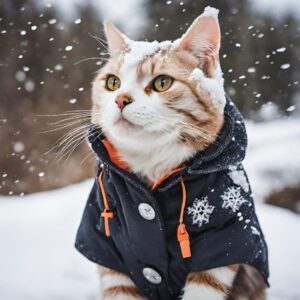Kittens will meow to their mothers but adult cats typically do not use meowing to communicate with each other.
This suggests that meowing is a communication directed to humans and can help us better understand why do cats meow when you sneeze.
Let’s explore different behaviors and sounds to debunk this unique cat communication skill.
Table of Contents
The Cat’s Perception of a Sneeze
Cats have sensitive ears, and sneezing is a sudden, loud noise. This can trigger a reflex in the cat’s middle ear that causes tiny muscles to contract to reduce sound transmission.
However, sneezes are so sudden and forceful that this reflex often fails to provide adequate protection, making the cat feel startled.
The cat’s reaction to the sneeze may depend on its personality, past experiences, and environment.
Some cats may perceive a sneeze as a threat or a sign of distress. In this case, the cat’s meow may respond to what it sees as a potential danger. Other cats may be startled by the sudden noise and meow in surprise or confusion.
Environmental Influences
A cat’s environment can also influence its reactions to stimuli, including human sneezes. Cats that live in noisy environments may be less likely to react to a sneeze as they are used to loud noises. On the other hand, cats that live in quiet environments may be more likely to react to a sneeze, as the noise is more noticeable and potentially startling.
The Human-Cat Relationship
A cat’s relationship with its human companion can also influence its reaction to a sneeze. Cats that are closely bonded with their humans may be more likely to react to their human’s sneeze, as they are more attuned to their behaviors and noises.
Reasons Why Your Cat Meows When You Sneeze
You scared them
Cats have a natural aversion to loud noises, so a sudden sneeze can scare them. Imagine sitting on the couch with your cat curled up next to you, peacefully napping. You sneeze loudly, and your cat jumps up in surprise, meowing frantically. The cat’s meow is a way of saying, “What was that?!” and trying to figure out what is happening.
Cats with sensitive hearing are more likely to be startled by loud noises. For example, if you have a cat with breed-specific hearing problems, such as a Siamese or Burmese, they may be more prone to being startled by sneezes and other loud noises.
If you are a frequent sneezer, your cat may become accustomed to the sound and not react as dramatically. However, it is still important to be mindful of your cat’s reaction and avoid startling them unnecessarily.
You annoy them
Cats are creatures of habit and routine, and they don’t like disruptions to their schedule. If your sneeze interrupts their nap, meal, or playtime, they may meow to express annoyance.
They Are Coping You
Some cats may meow in response to your sneeze because they are trying to imitate you. This is known as mimicry, and it is a behavior that is seen in many different animals, including cats.
Cats may also mimic your behavior if they see you doing something they are interested in. For example, if you always say “bless you” after sneezing, your cat may start meowing after you sneeze to get you to say it.
Mimicry is a sign that your cat is paying attention to you and that they care about you. It is also a sign that they are intelligent and adaptable animals.
If your cat meows in response to your sneeze, take it as a compliment! It means that they are paying attention to you and trying to communicate with you.
They Think You are Expressing Aggression
Cats have very sensitive hearing and sometimes misinterpret a sneeze as a hiss. This is especially true if you have a loud or forceful sneeze.
Hissing is a way for cats to communicate fear, aggression, or discomfort. If your cat thinks you’re hissing at them, they may meow in response to ask what’s wrong or to try to de-escalate the situation.
If your cat meows after you sneeze, reassuring them that you’re not angry or threatening them is important. You can do this by speaking to them in a calm voice and petting them gently.
They Are Confused or Intrigued
When cats first encounter a sneeze, they may be confused or intrigued by the loud and sudden noise. Cats are naturally curious animals, and they may meow to try to understand the sound and where it’s coming from.
If your cat seems interested in your sneeze, you can satisfy their curiosity by simulating another sneeze and reassuring them that everything is okay. This is especially important if your cat is a former stray, as they may be more wary of loud and sudden noises.
Other Cat behaviors caused by your sneeze
Jumpy Cats
Some cats may have noise aversion, a condition in which cats are overly sensitive to noise. If your cat is jumpy or startled by sneezes, it’s important to be patient and understanding. You can also reduce their exposure to loud noises and create a calm and relaxing environment for them.
Bless You Meows
Many cat owners have noticed that their cats meow after they sneeze. This can be interpreted as a sign of affection or concern or as a way for the cat to check on you. Some people also believe cats meow after sneezing to say “bless you.”
Chirping
Some cats chirp after their humans sneeze. This is a way for the cat to communicate with you or express their excitement or curiosity.
Escape
Some cats may try to run away or escape when their humans sneeze. This is because they may be startled or scared by the noise. It’s important to give your cat space if they need it and to avoid forcing them to stay near you if they are scared.
Agitation and Disgust
Some cats may show signs of agitation or disgust when their humans sneeze. This can include flattening their ears, turning away from you, or hissing. It’s important to respect your cat’s boundaries and to avoid doing anything that makes them uncomfortable.
Aggressive Reactions
In rare cases, a cat may become aggressive when their human sneezes. This is because they may interpret the sneeze as a threat. If your cat ever becomes aggressive towards you, it’s important to consult with a veterinarian to rule out any underlying medical conditions.
The Silent Observers
Some cats simply ignore their human’s sneezes. This is perfectly normal, and it doesn’t mean your cat doesn’t love or care about you.
How to Respond to Your Cat’s Meow
The best way to respond to your cat’s meow after you sneeze is to pay attention to their body language and behavior. If they seem scared or startled, you can reassure them by speaking softly and calmly, petting them gently, or giving them a treat.
If they seem curious or intrigued, you can satisfy their curiosity by simulating another sneeze or talking to them about it.
Here are some specific tips:
- Speak softly and calmly. Cats are sensitive to loud noises, so speaking softly and calmly can help to reassure them.
- Pet them gently. A gentle pet can help to comfort and reassure your cat.
- Give them a treat. A small treat can be a positive reinforcement for your cat and help them to associate your sneeze with positive experiences.
- Simulate another sneeze. If your cat seems curious about your sneeze, you can try to simulate another sneeze by making a sneezing noise. This can help to satisfy their curiosity and let them know that everything is okay.
- Talk to them about it. You can also talk to your cat about your sneeze in a gentle and reassuring voice. This can help to build communication and trust between you and your cat.
When to Seek Professional Advice
While it is generally not a cause for concern if your cat meows when you sneeze, there are some situations where it might be a good idea to seek professional advice:
- If your cat’s behavior changes suddenly. If your cat starts meowing after you sneeze more often than usual or if their meowing seems distressed or anxious, it could be a sign of a health issue or a behavioral problem.
- If your cat is showing other signs of distress. If your cat is also exhibiting other signs of distress, such as hiding, aggression, or loss of appetite, it is important to consult a veterinarian to rule out any underlying medical conditions.
If you are concerned about your cat’s reaction to sneezing, please consult a veterinarian or a professional cat behaviorist. They can help you to identify any underlying issues and provide guidance on how to address them.
The Role of Meowing in Cat-Human Interaction
Meowing is one of the most important ways that cats communicate with humans. Cats meow to get attention, to express hunger or discomfort, or to indicate that they want to play. Some cats may also meow out of habit or because they have learned that it elicits a certain response from their human companions.
When a cat meows in response to a human sneeze, it is likely trying to communicate something. It may be expressing concern or confusion, or it may simply be trying to get your attention. The specific meaning of the meow can depend on the individual cat and its relationship with its human companion.
For example, a cat that is startled by a loud sneeze may meow to express its surprise or fear. A cat that is concerned about its human’s health may meow to check on them. And a cat that is simply seeking attention may meow to let you know that it is there.
It is also important to note that cats may meow in different ways to express different things. For example, a cat that is hungry may meow with a high-pitched, insistent meow, while a cat that is in pain may meow with a low-pitched, mournful meow.
By paying attention to your cat’s body language and vocalizations, you can learn to understand what it is trying to communicate when it meows. This can help you to better meet your cat’s needs and to strengthen your bond with your feline friend.
The Different Types of Meows That Cats Make and What They Mean
Cats make a variety of different meows, each with its own meaning. Here are a few examples:
- A short, high-pitched meow: This type of meow is often used to get attention or to express excitement.
- A long, low-pitched meow: This type of meow is often used to express hunger or discomfort.
- A trill: This type of meow is a sign of happiness or contentment.
- A chattering meow: This type of meow is often used when a cat is excited about something, such as seeing a bird or playing with a toy.
- A hiss: This type of meow is a sign of aggression or fear.
It is important to note that every cat is different and may have its own unique vocalizations. However, by paying attention to your cat’s different types of meows, you can learn to understand what it is trying to communicate.
My Senior Paws is a participant in the Amazon Services LLC Associates Program, an affiliate advertising program designed to provide a means for sites to earn advertising fees by advertising and linking to Amazon.com. We also participate in other affiliate programs which compensate us for referring traffic.




